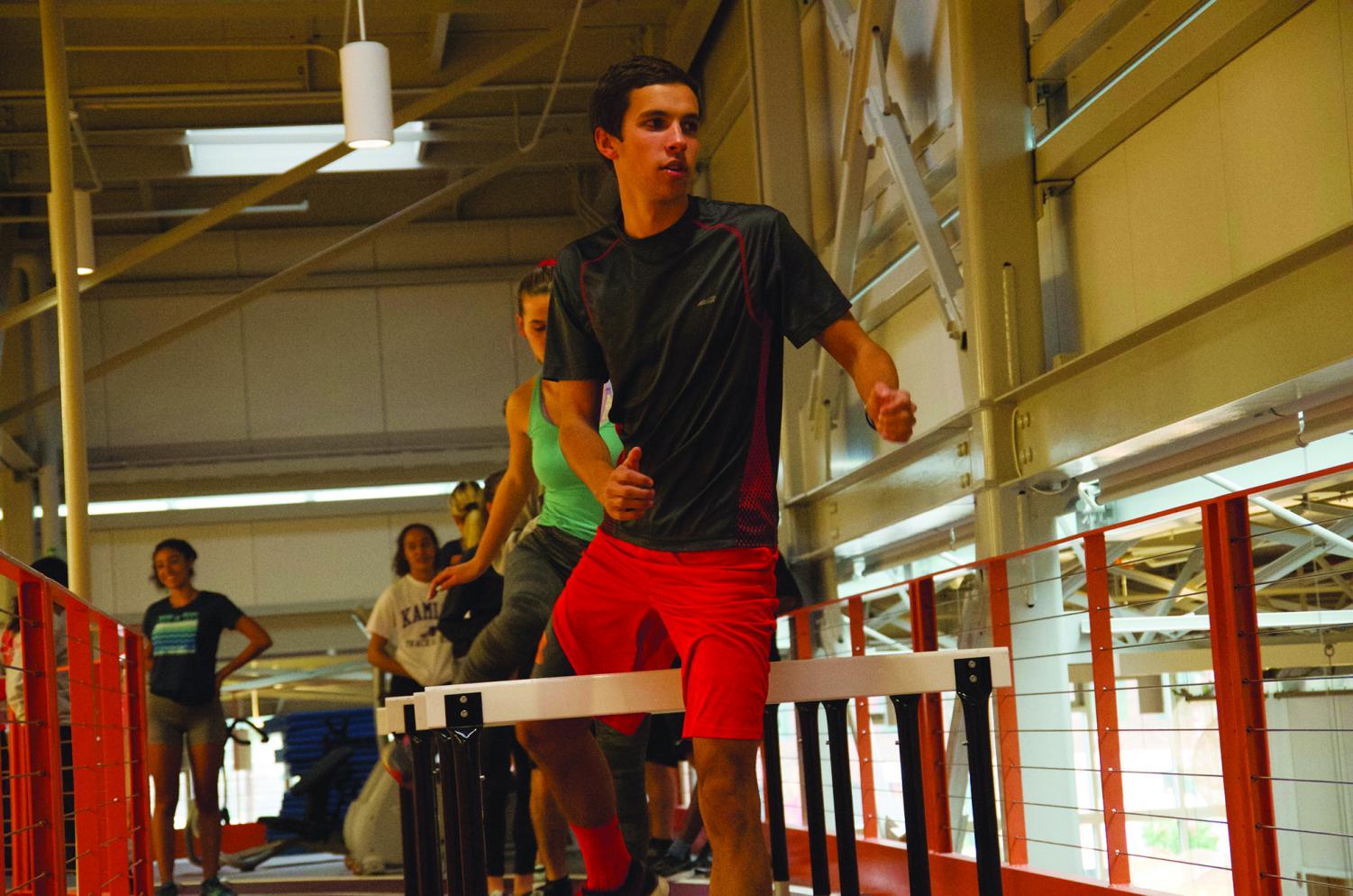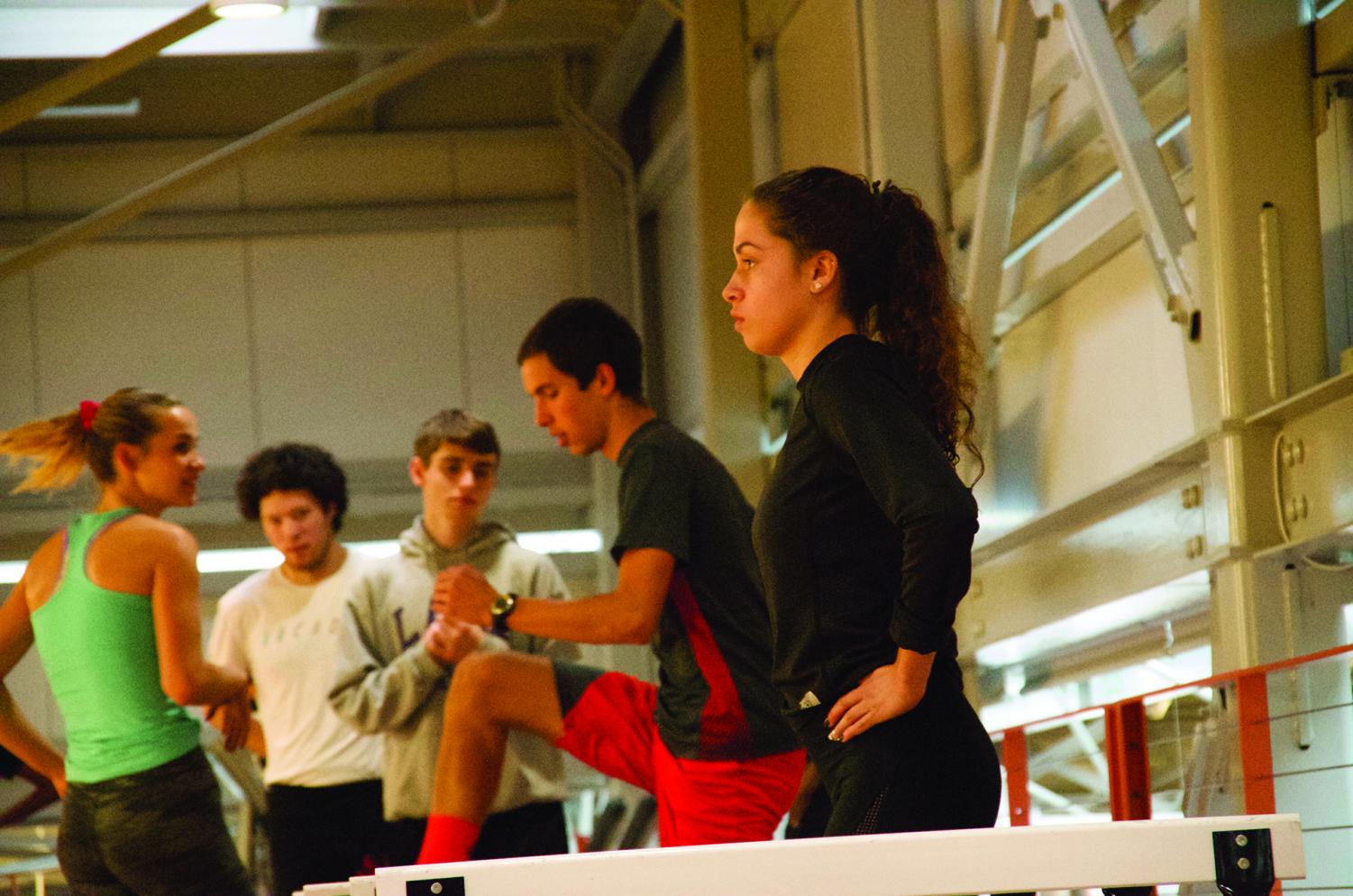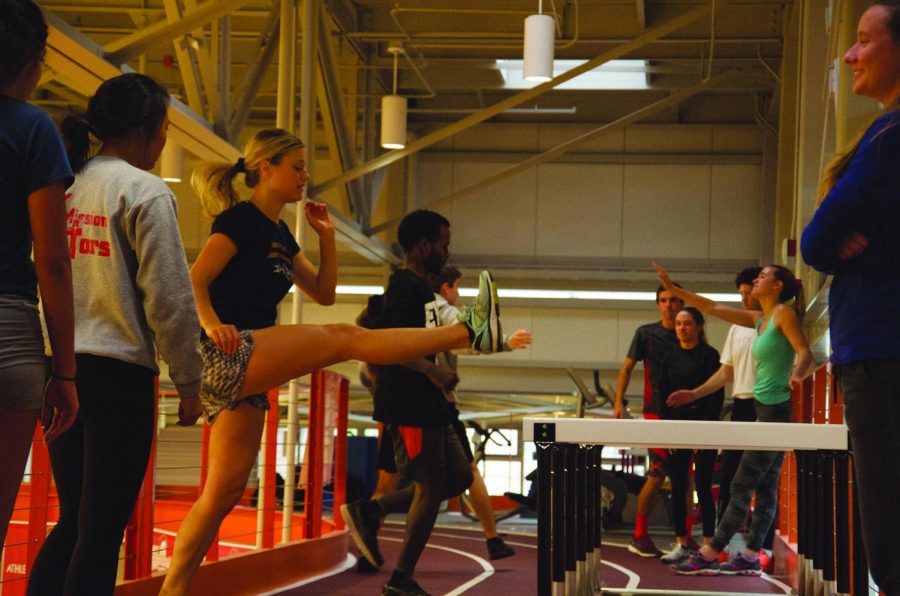Setting the Pace
Kicking it during warm up drills with Kaitlin Morgan (left). Coach Tansey Lystad (right foreground) leads cross country practice on Monday Oct. 8 at the Walt Price Student Fitness Center.
Running can be as simple as left foot, right foot, repeat. But it’s not that easy. Cross country running requires endurance, strategy, focus and stamina. In a sport with the competitive season lasting from August to November, training during the summer months is key to honing these skills and traits for a successful race season. Tansey Lystad, the Trojans cross country coach, is in the summer of her tenure with the team.
Lystad hit the ground running as coach of the Trojan cross country team in August 2017. She says, “I got hired last year and it was kind of a quick turnaround since we usually start practicing in August. We didn’t have our first official practice until I think the third week of August last year.” A late start to the season wasn’t the only challenge Lystad faced during her first year in charge, “When I came in, I didn’t recruit anybody that came in last year. So, I had a whole team of kids that I had never met before, basically all I saw was their times.”
This season Lystad has been able to have her finger on the pulse of the team from day one. She says, “We actually met with the team in June. Everyone got their summer training, because the summer training is really what sets the good runners apart from the great runners.” Running can be a grueling test of an individual’s body, mind and spirit. Cross country is a team sport, it relies on chemistry and bonds among teammates to lay the foundation for successfully pushing one another to improve. In August after their first week of training, the team hit the road on a camping trip in order to strengthen their rapport.

Isaiah Funston finishes hurdle drills that loosen up muscles before running.
Lystad knows what it takes to succeed at the collegiate level and beyond. She competed at the NCAA Division I level for five years and was twice named to the All American team. She earned these honors for being in the top 40 finishers at the national meet, in cross country, while running for the University of Portland. After college Lystad has represented the U.S. national team in international competitions. Lystad says, “It’s always been my goal to run for Team USA at some point and cross country is my favorite so that was a huge moment for me. I basically made like the U.S. ‘B’ team for cross country that year and that’s kind of the hope is to make the ‘A’ team at some point.”
After minoring in psychology and completing her Master’s degree in Athletic Leadership at Boise State University, Lystad is ready to put her stamp on the Trojan cross country program. She talks to the team frequently about the cognitive side of the sport, gives book recommendations and also engages in visualization practices with them, in order to mentally picture and prepare for positive outcomes. “It’s awesome to see kids that you know have a little bit left and maybe they haven’t had the best training or coaching situation leading up to the point where you get them. And that you can try to help create that change for them to see that they have so much more left in the sport. Like, we always have more in ourselves than we originally think, so sometimes you just have to have somebody else tell you that,” says Lystad.
Most of the team members have to juggle going to school, holding down a job and running. It can be a challenge to coordinate schedules so that everyone can practice together as a team. Each participant works out with running partners, but it’s also important to have each set of running partners present at squad practices. Lystad says, “I don’t have a 100% scholarship for every single kid on the team so a lot of them have to find other ways to fund their time here at Everett. Working is a pretty key part of that. That’s also one thing that impresses me too, how well they’re able to balance all three of those pieces because it can get kind of overwhelming.”

Ellee London (right foreground) and teammates focus on stretching before practice.
Part of Lystad’s approach to developing the team also applies to academics. All freshmen are required to do study hall hours and then after that first quarter it’s based on their grade point average (g.p.a.) So, the better a runner’s g.p.a. is, the fewer hours of study hall that she mandates. “The reason we do that is most of these kids are trying to move on to a four-year school. Having a good g.p.a helps in that transfer process and also, it makes them eligible for scholarships too,” says Lystad.
Cross country results for a season can best be measured in improvements. For runners, it’s being properly prepared physically and mentally to finish stronger and faster as the year progresses. Lystad’s Trojan coaching career is just getting started and now is the time when she’s putting in the work that will pay off later. She says, “Last year was just trying to get a handle on everything, because things before I was here had been so chaotic. I was just trying to get everything moving in the same direction, and then that’s what this year is more focused on. Getting more of those coaching pieces put in because there was a lot of managerial stuff last year.”
“The days are long and it’s kind of crazy sometimes, but it’s such a privilege to have this job,” she says. Lystad lights up, “I think sometimes we take it for granted as coaches that we have such an influence on these kids’ lives and this is such a formative time period in their life that we can either do that right or wrong. The way we do it is through running, but it’s so not about the running.”

What interests you about journalism?
The ability of stories to provide information, context and a further understanding.
Where does The Clipper...










